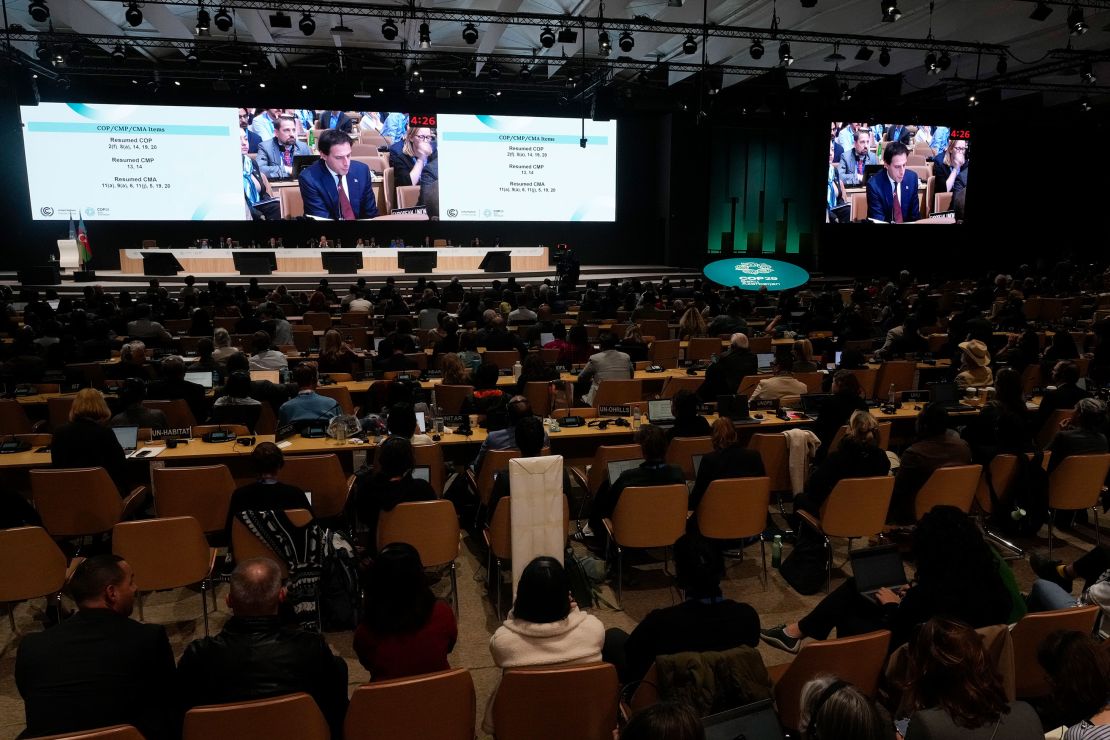CNN
—
The world agreed to a new climate deal at COP29 in Baku, Azerbaijan, Saturday, with wealthy countries pledging to provide $300 billion annually by 2035 to poorer countries to help them cope with the increasingly catastrophic impacts of the climate crisis — a figure many developing countries criticized as vastly insufficient.
The agreement came after more than two weeks of bitter divisions and fractious negotiations, thrown into chaos by boycotts, political spats and open celebrations of fossil fuels.
At points there was fear the talks would implode, as groups representing vulnerable small island states and the least-developed countries walked out of negotiations Saturday. But at 2:40 a.m. local time Sunday, more than 30 hours after deadline, the gavel finally went down on the agreement between nearly 200 countries.
The $300 billion will go to vulnerable, poorer nations to help them cope with increasingly devastating extreme weather and to transition their economies toward clean energy.
“It has been a difficult journey, but we’ve delivered a deal,” said Simon Stiell, head of the United Nations Framework Convention on Climate Change. “This new finance goal is an insurance policy for humanity, amid worsening climate impacts hitting every country.”
The amount pledged, however, falls far short of the $1.3 trillion economists say is needed to help developing countries cope with a climate crisis they have done least to cause — and there has been a furious reaction from many developing countries.
In a fiery speech immediately after the gavel went down, India’s representative Chandni Raina slammed the $300 billion as a “paltry sum,” and called the agreement “nothing more than an optical illusion” and unable to “address the enormity of the challenge we all face.”
“We are leaving with a small portion of the funding climate-vulnerable countries urgently need,” said Tina Stege, Marshall Islands climate envoy.
Stege heavily criticized the talks as showing the “very worst of political opportunism.” Fossil fuel interests “have been determined to block progress and undermine the multilateral goals we’ve worked to build,” she said in a statement.
What the deal sets out
CO29 focused heavily on finance, a vital climate issue but one of the thorniest politically.
Rich countries, which are overwhelmingly responsible for historical climate change, agreed in 2009 to provide $100 billion a year by 2020 to developing countries. That pledge, already viewed as woefully insufficient, was only met in 2022, two years past the deadline.
The task at Baku was to come up with a new number.
The new deal agreed to on Saturday requires wealthy countries, including the US and European nations, to provide $300 billion every year by 2035, made up of public and private finance.
While the agreement also refers to a wider ambition to scale up to $1.3 trillion, developing nations wanted rich countries to commit to taking on a much larger share of this, and for the money to come predominantly in the form of grants rather than loans, which they fear will trap them further in debt.

The G77 group of developing countries had called for a sum of $500 billion. But richer nations rejected higher figures as unrealistic given current economic circumstances.
“We have arrived at the boundary between what is politically achievable today in developed countries and what would make a difference in developing countries,” said Avinash Persaud, special advisor on climate change to the President of the Inter-American Development Bank.
There was also a push for richer emerging economies such as China and Saudi Arabia to contribute to the climate funding package, but the agreement only “encourages” developing countries to make voluntary contributions, and places no obligations on them.
Li Shuo, director of the China Climate Hub at the Asia Society Policy Institute called the deal “a flawed compromise” that reflects the “harder geopolitical terrain the world finds itself in.”
A chaotic COP
The summit took place at the end of a year “virtually certain” to be the hottest on record and one in which the world has been hammered by deadly extreme weather, including back-to-back hurricanes, catastrophic flooding, devastating typhoons and severe drought in southern Africa.
The urgency of dealing with climate change has never been clearer. But this was always going to be a tricky COP.
It took place in Azerbaijan, a petrostate, and was awash in fossil fuel interests. More than 1,700 fossil fuel lobbyists or industry players registered to attend the talks, outnumbering almost all country delegations, according to an analysis by a coalition of groups called Kick Big Polluters Out.
The shadow of Donald Trump’s election in the US also loomed over proceedings. Trump has called the climate crisis a hoax, pledged to “drill, baby, drill,” and vowed to pull the US out of the landmark Paris climate agreement, stoking concerns about the future of multinational climate action.

Saudi Arabia, the world’s top oil exporter, which has pushed against ambitious action at past climate summits, seemed even more emboldened in Baku, publicly and explicitly rejecting any reference to oil, coal and gas in the deal.
“It’s been another shady, oil-stained COP,” said Friederike Otto, a climate scientist at Imperial College London. “Public interest in this COP has been low and cynicism feels like it has reached an all time high,” she said.
Many climate groups have heavily criticized the summit and its outcome.
“This has been the most horrendous climate negotiations in years due to the bad faith of developed countries,” said Tasneem Essop, executive director of Climate Action Network. “This was meant to be the finance COP, but the Global North turned up with a plan to betray the Global South.”
The outcome “offers false hope to those already bearing the brunt of climate disasters,” said Harjeet Singh of the Fossil Fuel Treaty Initiative. “We must persist in our fight, demanding a significant increase in financing and holding developed countries to account,” he added.
